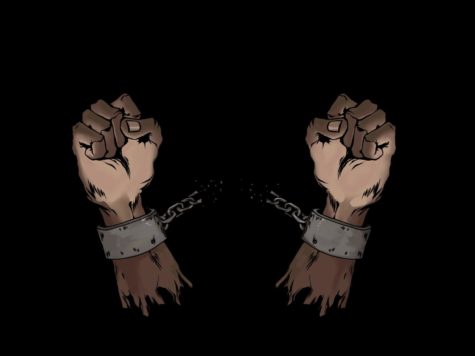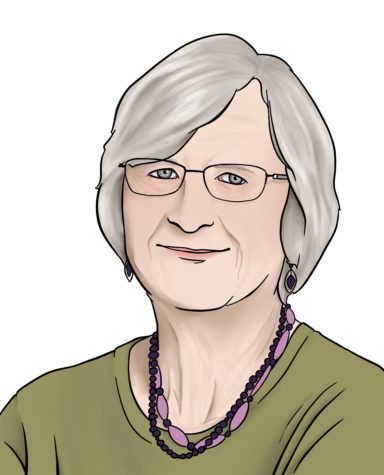Recognizing and respecting Liberty’s religions
March 27, 2017
According to a recent survey of 276 Liberty students, 79 percent of them adhere to some form of religion. The remaining 21 percent are either atheist or agnostic. How does Liberty’s religious variety affect our lives? And how do we confront the religious conflicts and stereotypes in our community? Join the Patriot Press as we explore the diversity of faiths at Liberty.
Defining Faith
Faith: Liberty students describe their religion as a guide for daily decisions, a comfort in difficult times, and a vital aspect of culture. Even those who are not followers of a religion see the effects of it, and they still pursue values greater than themselves or search for their own definition of a higher power. Whether it is faith in something greater or lack thereof, that decision—that discussion—is an important part of the lives of Liberty students. Some may even go so far as to say that it is exactly what makes us human.
Junior Max Kelsey sees his faith in God as an intuitive understanding.
“Faith is a feeling you have that you know something is true,” Kelsey said. “It means believing in something even though you might not necessarily have undeniable proof for it.”
This lack of “undeniable proof”, however, has led some people to have conflicting beliefs about the existence of a higher power. For senior Dhamanpreet Kaur, the desire for definitive evidence led her to become agnostic.
“I think the primary contributors to my beliefs are how much I value the scientific method and the fact that there needs to be evidence for something before you can justify it,” Kaur said.
Despite these beliefs, Kaur acknowledges the limitations of science in proving or disproving the existence of divine beings.
“There are things in this world that happen that are beyond what we can explain right now with the science that we have,” Kaur said. “Some people look to God and other such beliefs as a way of explaining that.”
Though Liberty students have differing ideas about religious faith, the beliefs we adhere to shape many aspects of our lives from everyday decisions to moral values. Whether we are confident or skeptical about the existence of a higher power, these distinctive beliefs often impact our responses to everyday situations.
“Whenever I have any sort of problems in my life, my faith is something that I can fall back on for support. I think that in general, people need to have something to fall back on when their life isn’t going very well and also to keep people from thinking that everything is about them,” Kelsey said.
Along with providing support during difficult times, many students cite their religion as a source of guidance for their decisions, such as junior Nick Croppi, who is Catholic.
“Faith builds a spiritual foundation for my life. It adds a moral compass that I find myself relying on a lot these days,” Croppi said.
Seeking Community
Because religion plays such a vital role in many students’ lives, some go to great lengths to seek a community that corresponds with their values. Junior Liam Stratford, a member of the Unity Free Think Movement, emphasizes the importance of fulfilling one’s spiritual needs. In his search for an appropriate church, Stratford tried multiple Christian organizations before finding the one that fit him.
“The people were super accepting. It’s a place where I feel safe,” Stratford said. “The other churches were great, but they weren’t right for me.”
Stratford encourages others to explore different options to find a faith that complements their personal needs.
“Do some research or talk to your peers if you’re comfortable with that,” Stratford said. “There are a lot of smaller religions that are way more flexible with what you think.”
Though faith is a largely personal concept, it is often influenced by the beliefs of other individuals. A religious community can have a positive impact on many students’ lives. Junior Ritvik Vudathu finds this true in the Hindu community.
“My favorite part about my religion is that you’re always believing that good things will happen, and the people that you’re surrounded by believe the same thing too,” Vudathu said. “The interconnectedness between people is really cool to see.”
With student who share their relatives’ beliefs, family is often the first unit of religious organization. For example, junior Truman Ricks’ parents first led him to his faith.
“I was born into being a Mormon, but my parents have given me the choice to believe what I’d like,” Ricks said. “Being completely honest, I’m glad to be a Mormon. It’s nice to be a part of something bigger, to feel that I’m not alone in this world.”
Respecting Beliefs
With a reported 20% of Liberty students adhering to a different faith than the rest of their family, conflicting beliefs are almost inevitable. For Kaur, differing religious affiliations have caused disagreements between family members. Kaur’s agnostic beliefs conflict with those of her parents, who practice Sikhism.
“I’ve definitely been forced to go to the temple sometimes when I don’t want to. My parents say I have to go because it’s a family thing,” Kaur said. “There have also been conflicts with everyday situations. One time my mom said, ‘Oh, you’re waiting for your SAT scores to come, you should pray’, and I told her that I didn’t think that was going to do anything.”
Disagreements over religion can extend beyond family members, affecting relationships with other students. Junior Erik Simmons, who is also agnostic, has experienced this personally.
“When it comes to interacting with other people who have religion as a bigger part of their life, there are times when there is conflict, especially given my bisexuality,” Simmons said. “But usually whenever I encounter people with strong religious beliefs, they have a lot of love and compassion in them.”
Simmons also encourages students, whether religious or not, to not let differences in beliefs interfere with relationships.
“I’ve always heard this quote that ‘just because you’re atheist doesn’t mean you’re intellectually superior; just becuase you’re religious doesn’t mean you’re morally superior’. It’s this idea that these things shouldn’t separate us,” Simmons said.
Along with disagreements over beliefs, conflict can stem from ignorance about different faiths. This was the case for junior Suzy Beeman, who has found that most people are unfamiliar with her polytheistic religion, Asatru.
“Many people develop negative views of my religion due to lack of understanding,” Beeman said. “Because Asatru is such a vast minority, people only judge it with their personal bias. I’d love to answer questions, not receive hatred.”
Combating Stereotypes
As a result of people’s frequent misconceptions about them, religious organizations are often subject to stereotypes. While these labels may be inaccurate, they continue to play a major role in our perception of religions.
“I told one of my friends that I was Catholic, and she said, ‘Oh, so you believe one plus one equals God’,” Croppi said. “I had to explain to her, ‘no, not exactly’.”
Regardless of their faith, adherents often encounter incorrect stereotypes, as observed by freshman Spencer Goldstein.
“There’s the stereotype that Jewish people are addicted to money, which is completely false,” Goldstein said. “It’s really annoying, because people always bring it up. If I pick a penny up from the sidewalk, they immediately say it’s because I’m Jewish.”
Despite the negative implications of many religious stereotypes, Ricks contends that they are not always harmful.
“I’m actually pretty happy about most of the stereotypes about Mormons—that Mormons bake good cookies, that Mormons are super nice to everyone,” Ricks said. “The one that I’d say bothers me the most is the stereotype that Mormons hate the LGBTQ community, which is untrue. While we may not support it, we don’t disapprove of those individuals.”
To combat these stereotypes, social studies teacher Peter Kurtz stresses the importance of fostering understanding.
“We should at least be accepting of different peoples,” Kurtz said. “That doesn’t mean that we have to believe what they believe, but they should at least have the right to practice certain things as long as it doesn’t cause other people harm.”
According to Kurtz, this acceptance of others is essential in creating a welcoming community for individuals of all religious faiths.
“Unity is important. We should look to include people rather than segregate and oppress them,” Kurtz said. “If we’re going to live together in a community as one, we should learn to celebrate and accept our differences. It’s these differences that make our world interesting and enjoyable.”









